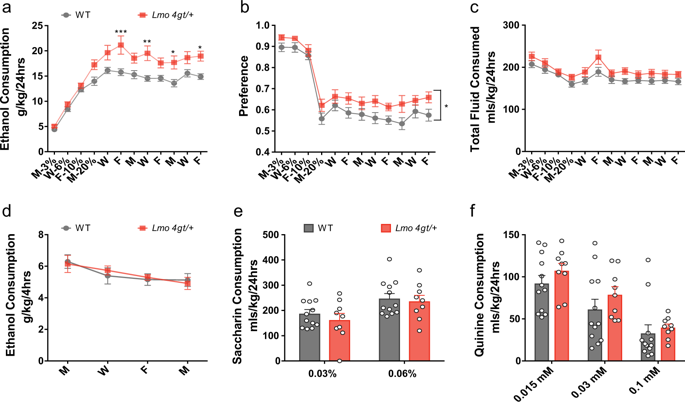当前位置:
X-MOL 学术
›
Mol. Psychiatry
›
论文详情
Our official English website, www.x-mol.net, welcomes your feedback! (Note: you will need to create a separate account there.)
Differential regulation of alcohol consumption and reward by the transcriptional cofactor LMO4.
Molecular Psychiatry ( IF 11.0 ) Pub Date : 2020-03-06 , DOI: 10.1038/s41380-020-0706-8 Rajani Maiya 1, 2, 3 , Matthew B Pomrenze 1, 2, 4 , Thi Tran 1 , Gayatri R Tiwari 2 , Andrea Beckham 1 , Madison T Paul 1 , R Dayne Mayfield 1, 2 , Robert O Messing 1, 2, 3
Molecular Psychiatry ( IF 11.0 ) Pub Date : 2020-03-06 , DOI: 10.1038/s41380-020-0706-8 Rajani Maiya 1, 2, 3 , Matthew B Pomrenze 1, 2, 4 , Thi Tran 1 , Gayatri R Tiwari 2 , Andrea Beckham 1 , Madison T Paul 1 , R Dayne Mayfield 1, 2 , Robert O Messing 1, 2, 3
Affiliation

|
Repeated alcohol exposure leads to changes in gene expression that are thought to underlie the transition from moderate to excessive drinking. However, the mechanisms by which these changes are integrated into a maladaptive response that leads to alcohol dependence are not well understood. One mechanism could involve the recruitment of transcriptional co-regulators that bind and modulate the activity of transcription factors. Our results indicate that the transcriptional regulator LMO4 is one such candidate regulator. Lmo4-deficient mice (Lmo4gt/+) consumed significantly more and showed enhanced preference for alcohol in a 24 h intermittent access drinking procedure. shRNA-mediated knockdown of Lmo4 in the nucleus accumbens enhanced alcohol consumption, whereas knockdown in the basolateral amygdala (BLA) decreased alcohol consumption and reduced conditioned place preference for alcohol. To ascertain the molecular mechanisms that underlie these contrasting phenotypes, we carried out unbiased transcriptome profiling of these two brain regions in wild type and Lmo4gt/+ mice. Our results revealed that the transcriptional targets of LMO4 are vastly different between the two brain regions, which may explain the divergent phenotypes observed upon Lmo4 knockdown. Bioinformatic analyses revealed that Oprk1 and genes related to the extracellular matrix (ECM) are important transcriptional targets of LMO4 in the BLA. Chromatin immunoprecipitation revealed that LMO4 bound Oprk1 promoter elements. Consistent with these results, disruption of the ECM or infusion of norbinaltorphimine, a selective kappa opioid receptor antagonist, in the BLA reduced alcohol consumption. Hence our results indicate that an LMO4-regulated transcriptional network regulates alcohol consumption in the BLA.
中文翻译:

转录辅因子 LMO4 对酒精消耗和奖励的差异调节。
反复接触酒精会导致基因表达发生变化,这被认为是从适度饮酒过渡到过度饮酒的基础。然而,这些变化被整合到导致酒精依赖的不适应反应中的机制尚不清楚。一种机制可能涉及招募结合和调节转录因子活性的转录共调节因子。我们的结果表明转录调节因子 LMO4 就是这样一种候选调节因子。Lmo4 缺陷小鼠 (Lmo4gt/+) 在 24 小时间歇性饮酒过程中消耗明显更多,并且表现出对酒精的增强偏好。shRNA 介导的伏隔核中 Lmo4 的敲低增强了酒精消耗,而基底外侧杏仁核(BLA)的击倒减少了酒精消耗并减少了对酒精的条件性位置偏好。为了确定构成这些对比表型的分子机制,我们对野生型和 Lmo4gt/+ 小鼠的这两个脑区进行了无偏转录组分析。我们的研究结果表明,LMO4 的转录靶标在两个大脑区域之间存在很大差异,这可以解释在 Lmo4 敲低时观察到的不同表型。生物信息学分析显示 Oprk1 和与细胞外基质 (ECM) 相关的基因是 BLA 中 LMO4 的重要转录靶标。染色质免疫沉淀显示 LMO4 结合 Oprk1 启动子元件。与这些结果一致,ECM 的破坏或降甲诺啡的输注,一种选择性 kappa 阿片受体拮抗剂,在 BLA 中减少了酒精消耗。因此,我们的结果表明 LMO4 调节的转录网络调节 BLA 中的酒精消耗。
更新日期:2020-04-24
中文翻译:

转录辅因子 LMO4 对酒精消耗和奖励的差异调节。
反复接触酒精会导致基因表达发生变化,这被认为是从适度饮酒过渡到过度饮酒的基础。然而,这些变化被整合到导致酒精依赖的不适应反应中的机制尚不清楚。一种机制可能涉及招募结合和调节转录因子活性的转录共调节因子。我们的结果表明转录调节因子 LMO4 就是这样一种候选调节因子。Lmo4 缺陷小鼠 (Lmo4gt/+) 在 24 小时间歇性饮酒过程中消耗明显更多,并且表现出对酒精的增强偏好。shRNA 介导的伏隔核中 Lmo4 的敲低增强了酒精消耗,而基底外侧杏仁核(BLA)的击倒减少了酒精消耗并减少了对酒精的条件性位置偏好。为了确定构成这些对比表型的分子机制,我们对野生型和 Lmo4gt/+ 小鼠的这两个脑区进行了无偏转录组分析。我们的研究结果表明,LMO4 的转录靶标在两个大脑区域之间存在很大差异,这可以解释在 Lmo4 敲低时观察到的不同表型。生物信息学分析显示 Oprk1 和与细胞外基质 (ECM) 相关的基因是 BLA 中 LMO4 的重要转录靶标。染色质免疫沉淀显示 LMO4 结合 Oprk1 启动子元件。与这些结果一致,ECM 的破坏或降甲诺啡的输注,一种选择性 kappa 阿片受体拮抗剂,在 BLA 中减少了酒精消耗。因此,我们的结果表明 LMO4 调节的转录网络调节 BLA 中的酒精消耗。



























 京公网安备 11010802027423号
京公网安备 11010802027423号